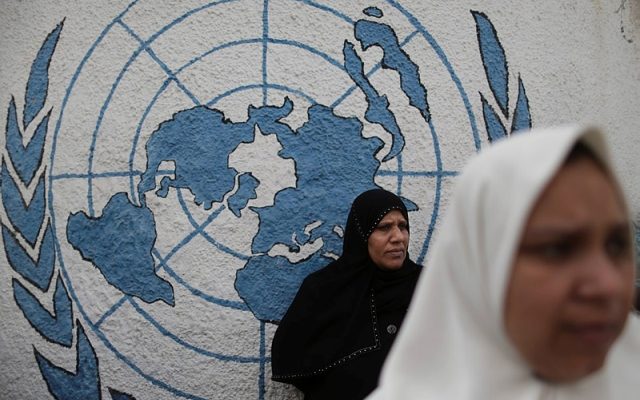Congress wants answers over why refugees around the world struggle for recognition and assistance, yet only the Palestinians have a dedicated UN agency and their numbers are inflated by a unique system which recognizes all descendants as refugees.
Both houses of Congress are at work to modify funding bills for the United Nations Relief and Works Agency (UNRWA), as part of an effort to investigate the very legitimacy of the decades-old agency, Michael Wilner reported in the Jerusalem Post Friday.
Both the House and the Senate want the State Department to, once and for all, define the term “Palestinian refugee,” and while they’re at it, reveal how many Palestinians are receiving aid from UNRWA.
UNRWA was established in 1948 to assist the 750,000 Palestinians who had left Israel. Since then, UNRWA has been a promoter of the Palestinian cause, funding as many as 5 million “refugees,” the majority of whom never left the homes where they were born in the Gaza Strip, the “West Bank,” eastern Jerusalem, or other Arab countries, to the tune of $1.23 billion annually, $250 million of which is donated by US taxpayers.
UNRWA treats Palestinian refugees differently than other refugees around the world. The UN defines “Palestinian refugees” to include all descendants of the original refugees from the year 1948—the only exception to the legal definition of refugees in the world. The nearly-one million Jewish refugees in 1948, as well as their children and grandchildren, are not considered refugees by the UN and are not allowed to return to their homes in Arab lands.
Additionally, unlike other refugees, only Palestinian refugees have their own UN Agency: UNRWA. Because the children born to the 1948 Palestinian Arab refugees are also considered refugees, Palestinians are the only refugees whose numbers are increasing exponentially from year to year.
Many in Congress have been saying since 2012 that the majority of Palestinians are permanently settled, and should not be under the jurisdiction of a refugee agency.
Needless to say, Wilner points out, “such a finding would fundamentally change the narrative of the decades-old conflict.”
Will the Real Palestinians Please Stand Up
The first Palestinian census was completed 15 years ago, and the head of the Palestinian Central Bureau of Statistics (PCBS) admitted then that the census was, in effect, “a civil intifada” rather than a scientific survey. In 2011 the Bureau attempted to correct that blatant misrepresentation, claiming that 2.6 million Palestinian Arabs inhabit Judea and Samaria.
But Israeli demographer Yoram Ettinger challenged those numbers, claiming they overstated the real number of Arabs there by as much as 66%. He explained that the PCBS’s total counts 400,000 Palestinians living overseas, and double-counts 240,000 Jerusalem Arabs. It also undercounted Palestinian emigration.
In 2014, UNRWA came up with the figure of 5 million Palestinian refugees living in Gaza, Judea and Samaria, Jordan, Syria and Lebanon, and the US responded by providing hundreds of millions of dollars for UNRWA’s health, education, and social service programs.
“UNRWA is sort of becoming an entitlement program of the Middle East, and the desire is to increase transparency on who actually are refugees relevant to that conflict,” a senior Senate aide familiar with the language told Wilner, suggesting the new bill “goes to the heart of the debate over UNRWA funding.”
Republicans in both houses have launched parallel efforts to compel the State Department to go on the record with who qualifies as a “Palestinian refugee,” and the combined version of the law, once passed, will compel the secretary of state to provide “a justification of why it is in the national interest of the United States to provide funds to UNRWA.”
The bill’s language continues: “Such justification shall include an analysis of the current definition of Palestinian refugees that is used by UNRWA, how that definition corresponds with, or differs from, that used by UNHCR, other UN agencies, and the United States Government, and whether such definition furthers the prospects for lasting peace in the region.”
And, naturally, “the committee directs that such report be posted on the publicly available website of the Department of State.”
The Unique Palestinian Refugee Status
Finally, it should be noted that there are two distinct definitions of the term “refugee” in international law.
A refugee, according to the United Nations Convention relating to the Status of Refugees, is a person who is outside their country of citizenship because they have well-founded grounds for fear of persecution because of their race, religion, nationality, membership of a particular social group or political opinion, and is unable to obtain sanctuary from their home country or, owing to such fear, is unwilling to avail themselves of the protection of that country; or in the case of not having a nationality and being outside their country of former habitual residence as a result of such event, is unable or, owing to such fear, is unwilling to return to their country of former habitual residence.
It is rare for a refugee status to extend beyond the lifetime of the original refugee, because normally it is expected that their offspring will have settled someplace else.
Not so regarding Palestinian refugees, according to UNRWA’s definition of the term, which includes the patrilineal descendants of the original “Palestinian refugees,” limited to persons residing in UNRWA’s areas of operation in the Palestinian territories, Lebanon, Jordan and Syria.
By: JNI.Media and World Israel News Staff





